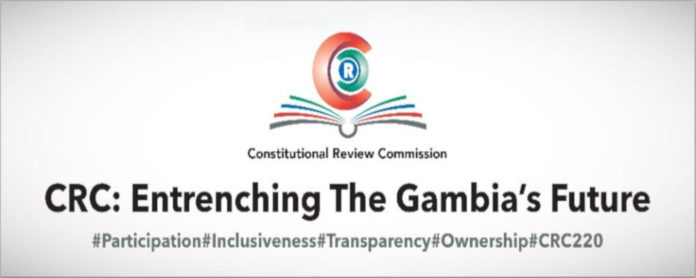By Nelson Manneh
The Constitutional Review Commission (CRC) on Saturday January 12th 2019, continued to engage with the residents of Tallinding and Bundung in the Kanifing Municipality, on the review process of the 1997 Constitution.
As the CRC aims to involve the citizenry in the review process, Commissioners explained to the gathering the reason why they want them to be involved in the making of the proposed new Constitution.
The people of Tallinding and Bundung were engaged by Commissioners in different ways. They started with a general meeting where Commissioners explained the current status of the 1997 Constitution and then asked what they want to be amended or included in the proposed new one. After that the people were reorganised to continue the process in focal group discussion.
Lamin Sanyang of Tallinding Bantaba in his contribution during the face to face discussion, told Commissioners that the death penalty should be replaced with life imprisonment with a clause to indicate that anybody sentenced for life, cannot be pardoned by any president or new regime.
“The reason why many people advocate for the death penalty is that the president has the right to pardon any individual convicted. In doing so, an individual who has been sentenced to life imprisonment, has the chance of being pardoned,” he said.
On other human right issues Sanyang said Diaspora Gambians and prisoners should have the right to vote except for those prisoners under life imprisonment; that young people, women and the disable should be empowered.
The women of Tallinding during the focal group discussions, voted that the proposed new Constitution should make provision for sound academic qualification for the presidency; that qualification for NAMs should be at least an Advanced Diploma Certificate. They added that Alkalos and Chiefs should not be appointed by the president.
The women agreed in unanimity for the president not to appoint the IEC Chairperson, Governor of Central Bank, Auditor General, Regional Governors and top civil servants; that instead there should be a special Commission to appoint people to these offices. Kaddy Badjie on her part said there should not be an individual without a country; that therefor the Commissioners should endeavor not to make people stateless.
“If someone is born here, has his or her education here and knows only this country, that individual should not be denied citizenship,” she said.
Meanwhile, Teachers who attended the CRC meeting in Old Yundum on Thursday January 10th 2019, told Commissioners that the proposed new Constitution should make provision for a Teachers’ Commission.
These teachers said they are the people who mould technocrats and therefore deserve to have a special Commission to look after their affairs and take care of their concerns.
“It is true that areas like Agriculture, Health and Land needs specials Commissions to look at their affairs separately. But we should all know that people who carry out these tasks, pass through the hands of teachers. Teaching is a noble profession carried out by humble people,” Alieu Saine asserted. Saine, a veteran teacher in the system for more than three decades, said at the level of the Gambia Teachers Union (GTU), they are advocating for a special Commission that will look at the affairs of teachers only. On human right issues, Saine said the death penalty should be revoked and replaced with life imprisonment, and that Diaspora Gambians and prisoners, should be allowed to vote.
“We need a president and NAMs who are well educated so that they will be able to analyse issues rationally. Therefore, their academic qualification should be moved to the level of advanced diploma certificate from the Gambia College or any other well recommended College,’’ he said.
In responding to the Commissioners concerning citizenship, Kaddy Sanyang said a child should not suffer from his or her parent’s ‘negligence’.
“If one’s parents came from other countries and settled here, they know that they should find national documents for their child. Unable to get these documents should not prevent such children from becoming citizens if they are born in Gambia,” she said.
During the focal group discussion, the elders of the community of Yundum and environs, voted that Alkaloship and Chieftaincies should be based on inheritance and not by election or appointments by the President; that the Governor of Central Bank, Regional Governors, IEC Chairperson and the Auditor General, should not be appointed by the President, but by a special body.
















